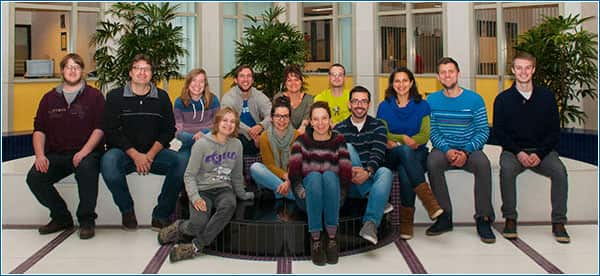Dr. Fulvio Reggiori
"Sharing a discovery with someone makes it even more rewarding."
I'm Fulvio Reggiori, and this is why I research.
Dr. Fulvio Reggiori is Professor of Cell Biology at the University Medical Center Groningen. He received his doctoral degree from the University of Fribourg in the laboratory of Andreas Conzelmann where he studied lipid biosynthesis and GPI-anchor remodeling. As a post-doctoral fellow, Dr. Reggiori worked on membrane protein trafficking for Dr. Hugh Pelham at the MRC Laboratory of Molecular Biology in Cambridge. He joined the laboratory of Dr. Daniel Klionsky in 2001 at the Life Sciences Institute of the University of Michigan where he started to investigate the molecular mechanism of autophagy using yeast as a model organism. Today, Dr. Reggiori is continuing this research as a Professor of Cell Biology at the University Medical Center Groningen. His laboratory is also committed to deciphering how pathogens subvert autophagy to invade host cells with a particular focus on the interaction between pathogens and ATG proteins.
Would you tell us what sparked your interest in science?
My interest comes from curiosity and fascination about nature, in particular about how living organisms have adapted to the environment and the molecular solutions that they have adopted to guarantee their survival and that of their offspring. As humans, we often think that we are smart and have developed brilliant solutions. While this is true, we have only acquired our knowledge in the past 4,000 years, whereas nature has been around for millions of years. As a scientist, you are confronted with something that is beyond what is known. It is quite an intellectual challenge just to decipher a little part of it and often discoveries allow you to appreciate the magnificence of nature.
Your research has helped characterize the mechanism of autophagy using host pathogen interactions and yeast as a model organism. Is there one particular experiment or discovery you feel most proud of?
I am proud of all the discoveries I have made together with each one of the past and current people in my laboratory, and with my collaborators. Sharing a discovery with someone makes it even more rewarding. If I had to mention one, it would be our astonishing finding that an autophagy protein was involved in a process other than autophagy. This discovery, along with similar findings from a few other laboratories around the same time, revealed that autophagy proteins are not exclusively involved in autophagy as it was once assumed.
Tell us more about the questions your lab is currently investigating and where you see your research moving in the future?
Our research is curiosity driven and often discoveries determine what we investigate next. Nonetheless, we are currently quite interested in unveiling unconventional functions of the autophagy proteins, i.e. functions outside the context of autophagy. We think that this dual function of a protein or cluster of proteins could be one of the regulatory mechanisms coordinating autophagy with other cellular processes.
Describe why your research is important to the ordinary citizen.
Numerous studies have revealed that the degradative capacity of autophagy could be beneficial by delaying the onset of various pathologies. Understanding the regulation and mechanism of autophagy in great detail is essential for specifically modulating autophagy to benefit human health.

Describe what developments or discoveries in selective autophagy is most exciting to you.
The long-held misconception that the cargo targeted for destruction is recruited to the autophagosome formation site persists, especially for researchers not familiar with the field. However, mounting evidence has shown that the cargo itself triggers autophagy and autophagosome biogenesis is localized, allowing selective enwrapping of the cargo by the nascent membrane. This is probably one of the major mechanisms underlying the specificity in selective types of autophagy.
Outside of autophagy, what research do you find especially exciting right now?
Recently, cryo-electron microscopy has allowed us to view the structures of a lot of complex biological systems. However, I am excited about discoveries in any field, which completely change our view or historical perspective of the world.
Tell us why you research? What motivates you to keep forging ahead?
I love my job and there is still a lot to be understand, even just in the field of autophagy. Moreover, the training of young scientists is a continuous effort and training through research is an effective approach.
And finally, if you could have one superpower, what superpower would that be?
Human beings are the most wonderful living organisms on this earth, but they are also inherently selfish. Humans can take actions based on their individual or particular group interests rather than having a global vision that could benefit the majority. I believe that several of the local and global problems we currently face is linked to this negative human behavior. Therefore, if I could have a superpower I would change our genetic makeup in such a way that we first look at others before ourselves.